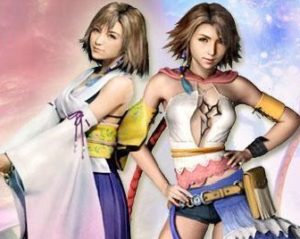A guest post by Sarah Golden.
I first saw Yuna when my friend introduced me to Final Fantasy X. I had heard of the game before, but as I watched the battle play out on the screen, Yuna’s character intrigued me.
 She stepped forward on the battle field wearing a Japanese kimono-like outfit, holding a staff and looking the monsters directly in the eye. But what could she possibly do? She didn’t have a sword, or any other weapon that could hurt such a fierce creature. In the blink of an eye, my friend chose a name from the menu, and Yuna closed her eyes, summoning a powerful creature.
She stepped forward on the battle field wearing a Japanese kimono-like outfit, holding a staff and looking the monsters directly in the eye. But what could she possibly do? She didn’t have a sword, or any other weapon that could hurt such a fierce creature. In the blink of an eye, my friend chose a name from the menu, and Yuna closed her eyes, summoning a powerful creature.
The creature emerged and in just one move, it killed the enemy. Yuna bowed to the battlefield as the victory music echoed in the air.
I had to play the game for myself after that.
Yuna’s journey from a summoner doing what the people want to a person with a vigor to live and appreciate life fascinated me.
In Final Fantasy X, Yuna is introduced as the daughter of a high summoner who defeated Sin, the evil monster that wreaks havoc on the world. But every ten years, Sin returns. In honor of her father, Yuna decides to follow in her father’s footsteps and bring joy to the people of Spira. She starts her journey by following the teachings, and her desire to help others inspires her to follow the path without question. But things change when she meets Tidus, and she begins to have her own thoughts and make her own decisions.
Later in the game, it is revealed that Yuna knew, from the moment she decided to become a summoner, that she had chosen a path toward death. Making a decision like that is not an easy task. The summoner must die in order to defeat Sin. By choosing this path, Yuna knows that she will meet the same fate. Every place that they visit, Yuna does all she can, and she tries to bring hope and happiness to the people. Although many summoners have faltered and given up the path, Yuna does not. Even when she learns that the teachings are lies, she does not stray from her path. She sees the ordeal through to the very end, but she changes the game.
By discovering a way to defeat Sin without causing the summoner to die, Yuna has a short lived victory. In the process of defeating sin, she has to say goodbye to two people that she cares about. One of which is Tidus, who she fell in love with.
At the end of Final Fantasy X, Yuna is between happiness and sorrow. She is a hero, but the heroic journey took its toll. She begins to search for a purpose in order to have a sense of accomplishment. This purpose begins her next chapter in the game Final Fantasy X 2.
When a sphere is found with the image of Tidus, Yuna decides to begin a new journey. She makes this decision at a very different chapter in her life, where she can make her own decisions and not have to do what the people expect her to. She decides to travel, and to collect pieces of history that are tied to the sphere with Tidus. She begins to hope again, and she takes that hope to a new level. She explores the world that she saved, and finds comfort in her new task and the new friends that she has made along the way. Her new purpose drives her to become more involved the world again. This world is torn between the believers of the temple, and the league that rebels against it. Yuna is asked to choose a side, and she is once again forced to make a decision. That decision echoes the risk of her first journey, but this time, Yuna refuses to have the same outcome. She discovers a way to save Spira without losing anyone else, and she finds a way to bring Tidus back.
Yuna’s character arc is an interesting and humanistic way to portray a hero. Her powers are not skills with the sword, but endurance and wisdom. In both games, Yuna is motivated through grief, but she uses that grief to achieve new goals.
It is possible that Final Fantasy X was more successful than Final Fantasy X2 because many people didn’t accept Yuna’s change of character. The story of the second game was lighter than the first, and Yuna was considered to be a drastically changed person. The second game a resolution to who Yuna actually was during both games. In the first game, she put most of her thoughts and dreams aside, but in the second game, she has the opportunity to actually discover who she was and what she was capable of. I see that as a successful story arc. She’s the same character in both games, because even when she followed the teachings, she did so in her own way. Her stubbornness is not obvious, because she only uses that stubbornness when she must make a very difficult decision.
From the kind and caring summoner to the bold and brave adventurer, Yuna is able to acknowledge her weaknesses and turn them into strengths. Throughout both games, Yuna’s resolve remains constant, and she stays true to her values. Her response to adversity makes her an admirable character with emotional and spiritual strength.
 Sarah Golden is a creative writer who draws inspiration from fairytales and folklore all over the world. She is a Kingdom Hearts addict and now owns her own keyblade! She is also a proud tour guide of Beast’s Castle at Magic Kingdom. With a Bachelor’s degree in English, Sarah hopes to share great stories through the written word and inspire others to be the heroes of their own story. She has written her first novel, and she is currently on a quest to publish it. Most of her other writing can be found on her blog Bara Lotus Garden: http://crystallizedheart.blogspot.com
Sarah Golden is a creative writer who draws inspiration from fairytales and folklore all over the world. She is a Kingdom Hearts addict and now owns her own keyblade! She is also a proud tour guide of Beast’s Castle at Magic Kingdom. With a Bachelor’s degree in English, Sarah hopes to share great stories through the written word and inspire others to be the heroes of their own story. She has written her first novel, and she is currently on a quest to publish it. Most of her other writing can be found on her blog Bara Lotus Garden: http://crystallizedheart.blogspot.com